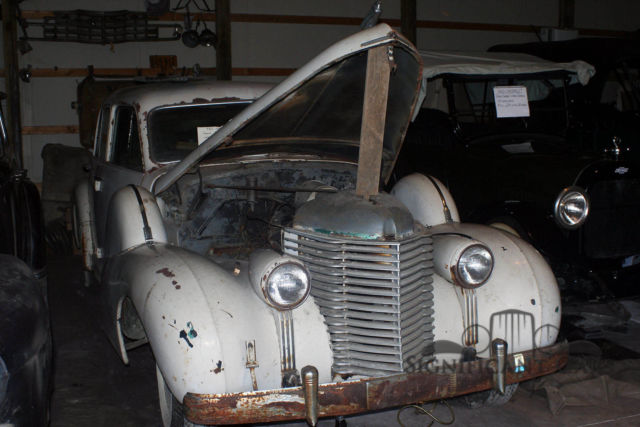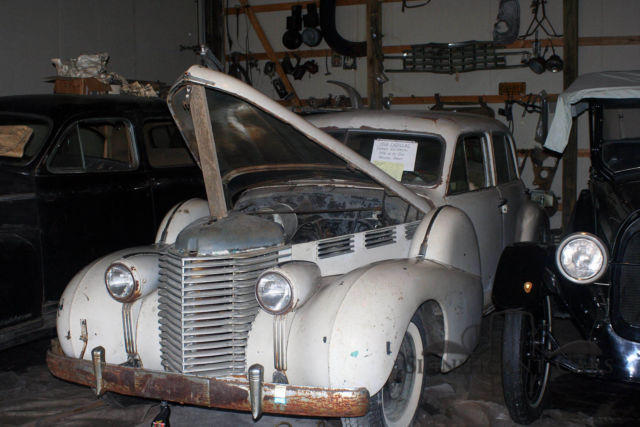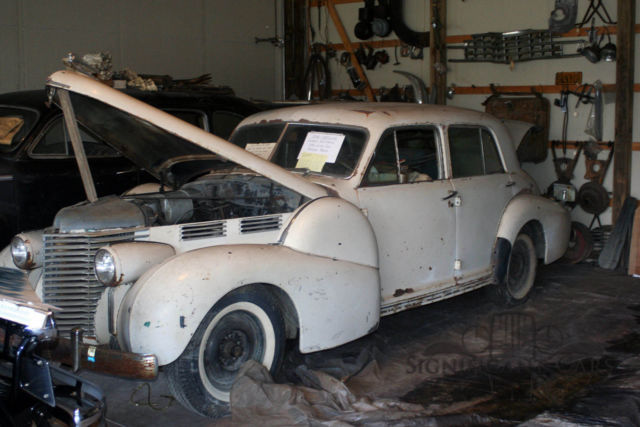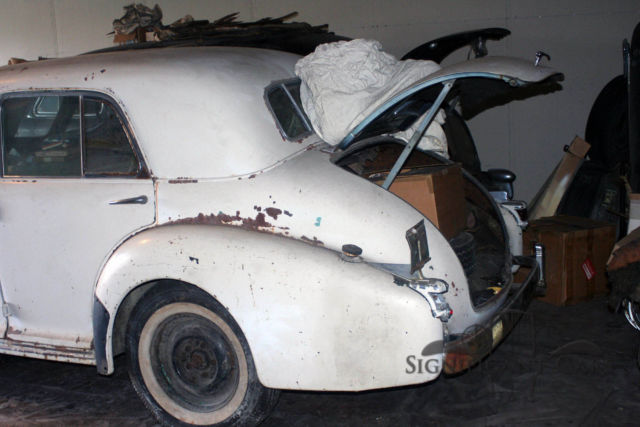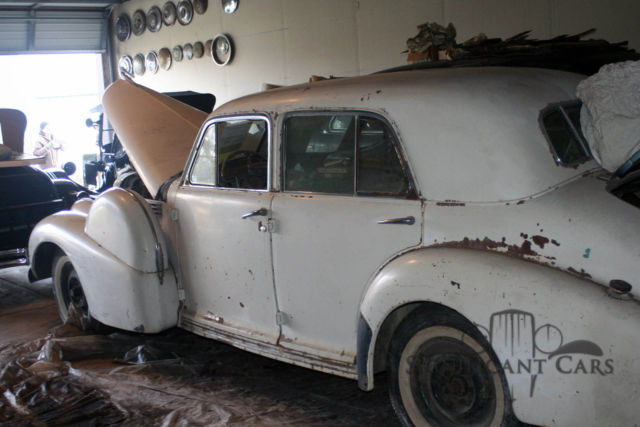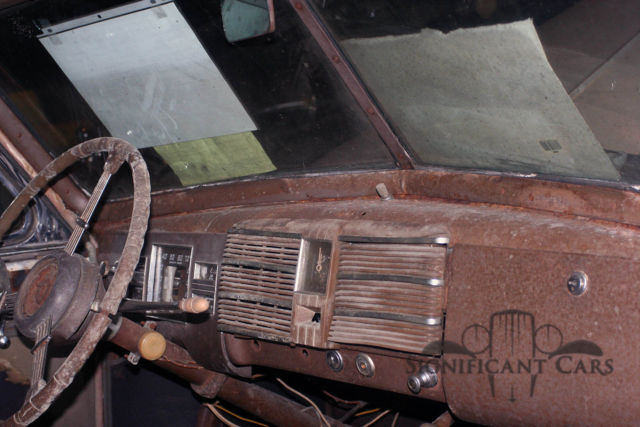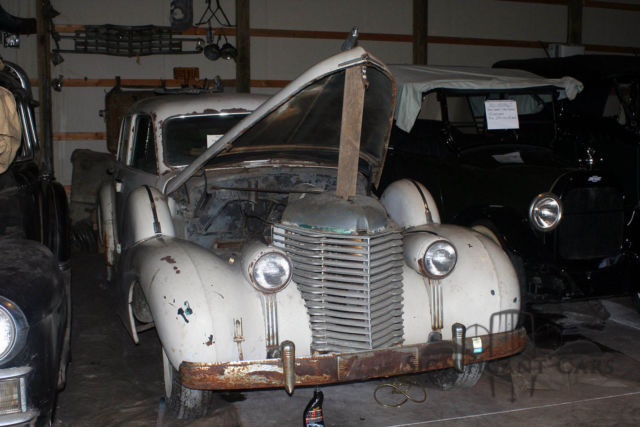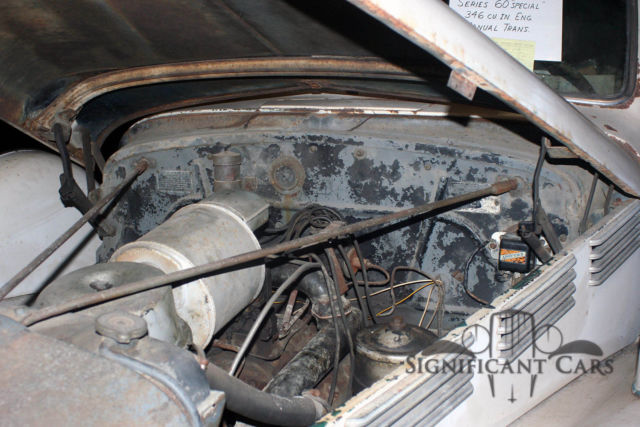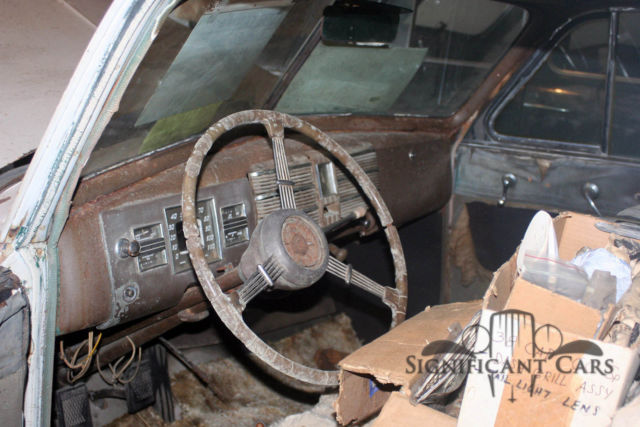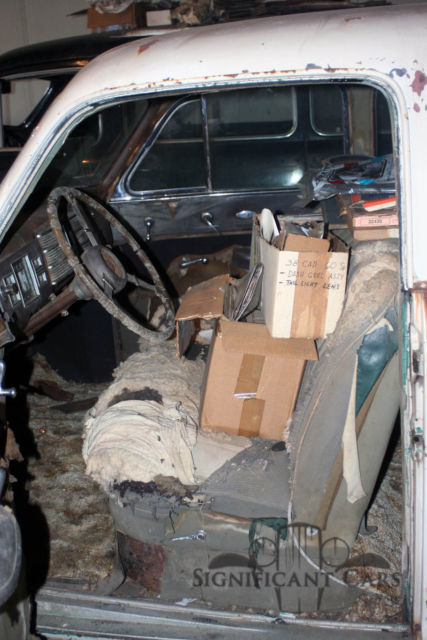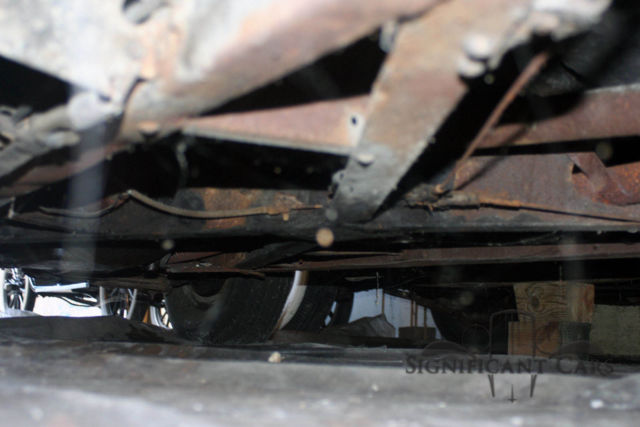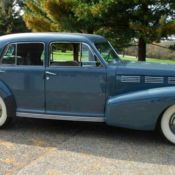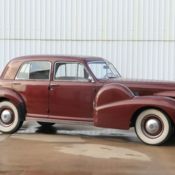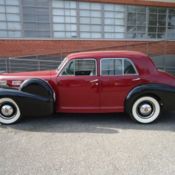1938 Cadillac 60 Special - Rare Sidemount Example!
Technical specifications of Cadillac Other 1938
| Price: | - |
|---|---|
| Condition: | Used |
| Item location: | Indianapolis, Indiana, United States |
| Make: | Cadillac |
| Model: | Other |
| Type: | Sedan |
| Trim: | 60 Special |
| Year: | 1938 |
| Mileage: | 80,000 |
| VIN: | 6271346 |
| Color: | White |
| Engine size: | Flathead V8 |
| Number of cylinders: | 8 |
| Transmission: | Manual |
| Drive type: | 3 Speed |
| Vehicle Title: | Clear |
| You are interested? | Contact the seller! |
Description
View our eBay StoreSign up for our Newsletter1938 Cadillac 60 Special Offered as a reserve auction.
This car has been in the seller's care since 1987, and has not run in many years, although the engine is free. It's a rare side mounted model and is straight and solid with little to no rust. The car comes with extensive literature, a Shop Manual, restored radio, engine overhaul gasket set, tool kit, dash grill set, rebuilt speedometer, new hubcaps and medallions. The car is equipped with a heater.
We have many more photographs of this car, please click on any image to be taken to our full-size image list!
The Cadillac Sixty Special name has been used by Cadillac to denote a special model since the 1938 Harley Earl-Bill Mitchell-designed Series 60 derivative. The Sixty Special name would soon be synonymous for some of Cadillac's most luxurious vehicles. This exclusivity was reflected in the introduction of the exclusive Fleetwood Sixty Special Brougham d'Elegance in 1973, and the Fleetwood Sixty Special Brougham Talisman in 1974.
For 1938, the Harley Earl-Bill Mitchell designed Sixty Special was added between Cadillac's lowest-priced line of cars, the "Series 60", and the "Senior" large-bodied Cadillacs. It replaced the model "70" (short-base Series 70). Although all first-generation 60 Specials were built at the Fleetwood Plant, the 60 Special was marketed as a Fisher Body car in 1938 and 1939. The new four-door sedan, designed to look like a convertible sedan, showcased trend-setting features including a completely integrated, coupe-like trunk (which launched "three-box" sedan styling); no running boards (which all makes soon followed); two-piece, convertible-style doors (Bill Mitchell called the '38 60 Special "the first hardtop"); a "four-window" canopy with more glass area than any Cadillac before; a steeply-raked windshield and four front-hinged doors. Contrary to what was then the trend in luxury automobiles, the new Sixty Special was intended as an owner-driven car, rather than a chauffeur-driven one.
It was built on a 127.0-inch wheelbase - 3-inch longer than the standard Series 60 cars. The new Sixty Special utilized a unique "X" frame underneath, which allowed the 4,170 lb. car to sit within its frame. This not only gave the new Cadillac the stiffest chassis on the market, but it was also 3 inches lower than other Cadillacs - with no sacrifice in headroom. The disappearance of running boards along the side and its lack of belt-line trim made the sleek car appear even lower. More important, it allowed shoulder and hip room to increase by over 5 inches without an increase in overall width. When combined with the brand-new column-mounted shift lever, the cars offered true six passenger comfort.
The Sixty Special was powered by Cadillac's standard 130 h, 346 cu in V8 engine. In its debut year, 3,703 Sixty Specials were delivered, at a base cost of $2,090 each - it was a success in every measure. The new Sixty Special outsold every other Cadillac model in its first year accounting for 39% of all Cadillacs sold. In 1938, aside from the standard 4-door sedan, two prototype models were built on the Sixty Special body - two very dashing four-door convertibles (one owned by GM executive, Larry Fisher, which was demolished by Harley Earl in a traffic accident and one sent to Europe, which was later recalled and consumed by GM Engineering in structural tests in preparation for the 1940 "Torpedo" bodies), plus one Sixty-Special coupe (driven personally for two years by GM President, Bill Knudsen).
A not well-received new front end, which was patterned on the Lincoln Zephyr and lacked the visual punch expected by Cadillac buyers, a modest change in trim level, and some new options appeared for Sixty Special in 1939. First among the new options was a retractable metal panel above the front seat called a "Sunshine Turret Top Roof," a predecessor to the moon roof. The sliding roof, patented by GM's Ternstedt Hardware division, was operated by a hand crank. Second was an optional retractable division glass in between the front and rear seats. This partition did not have a header in the roof, only channels between the door posts for the retractable glass to travel. The 1938 price of $2,090 remained for 1939 as well. More than 5,500 Sixty Specials were built for 1939, accounting for 40% of all Cadillacs sold, but only 280 of them were equipped with the sun roof option (of those 280 sun roof optioned cars, 55 of them were also equipped with the retractable glass partition). Special orders in 1939 included a convertible sedan built on the Sixty Special chassis for Prince Frederik of Denmark.
Starting in 1940, and for the remainder of its existence, the Sixty Special would be Fleetwood marketed, enjoying higher-priced molding, trim and upholstery like the Series 75 and 90. Thus it took over the Series 70's place, which was dropped for the 1938 model year, as Cadillac's most luxurious owner-driven large model, a role it would fill through 1976. For 1940, the price (for the third year in a row) and general styling remained the same, with only modest trim changes.
Of special note is that 1940 was the last year that side-mounted spare tires (optional on all Cadillacs, including Sixty Special) were offered. The Sixty Special line expanded to four models this year: Touring Sedan (the base model), Imperial sedan (priced at $2,230, it featured a retractable glass partition between the front and rear seats), and two open-front Town Car models (one style with a painted roof, the other with a leather-covered roof). These two very formal cars had a removable roof section over the front seat and a glass division window. Of the Sixty Specials built in 1940, 4,242 of them were the Touring model. There were 113 Imperials (including 3 that were also equipped with the sun roof), and lastly, only 15 Town Car models. Of the 15, 9 had the painted metal roof (priced at $3,465), and 6 were the formal leather-covered roof version (priced at $3,820).
1941 was the last year of Harley Earl and Bill Mitchell's original Sixty Special design, as an all-new 1942 model was in the works. Many consider the 1941 to the most beautiful of this series, though Mitchell himself favored the clean lines of the original 1938 model. For the first time, Cadillac had its own front end design—the "tombstone" grille with a high center section flanked by lower side sections—that would identify Cadillacs for years to come. The new "face" blended well with the original body, and the rear fenders now held full skirts. For 1941, the wheelbase was reduced by 1 inch (25 mm), down to 126 in. Sixty Specials showed a $105 price increase (for the first time) to $2,195. Power was still supplied by the same 346 cu in Cadillac engine as before, but was now rated at 150 hp Production totals include 3,878 Touring sedans (including 185 with the sun roof option), and 220 Imperial sedans (now priced at $2,345). Only 1 Sixty Special Town Car was made this year and used on the auto show circuit before being purchased by film director, C.B. DeMille. Featuring the leather-covered roof, it was the last one to come from Cadillac-Fleetwood.
There were nearly 17,900 Sixty Specials made from 1938 to 1941, including about a dozen custom bodied versions. Our Ebay Policies:
Significant Cars is one of the largest Collector Car Brokers and Dealers in the Country. Since 2003 we have worked hard to "change the way collector cars find new homes" by providing unparralleled web presentation of the cars we are representing. Most of our cars have over 30 photographs, and these can be viewed by visiting our website (our eBay handle dot com), or by clicking on any of the photographs in the black background area of our EBay listings. We welcome your call with any questions about any of our listings at anytime at 800-837-9902 and certainly encourage your personal inspection of any of the cars we are selling-just call us and we will be happy to set up an appointment for your to see and test drive the car.
We realize that eBay is a difficult venue to properly evaluate an item as complex as an automobile. You can feel secure bidding with confidence on any of our cars since we guarantee your satisfaction! Should you win the auction and come to see the car and decide you do not want it for any reason, no negative feedback will result, any deposit you may have paid will be cheerfully refunded.
Description images and copy © Significant Cars, Inc.
